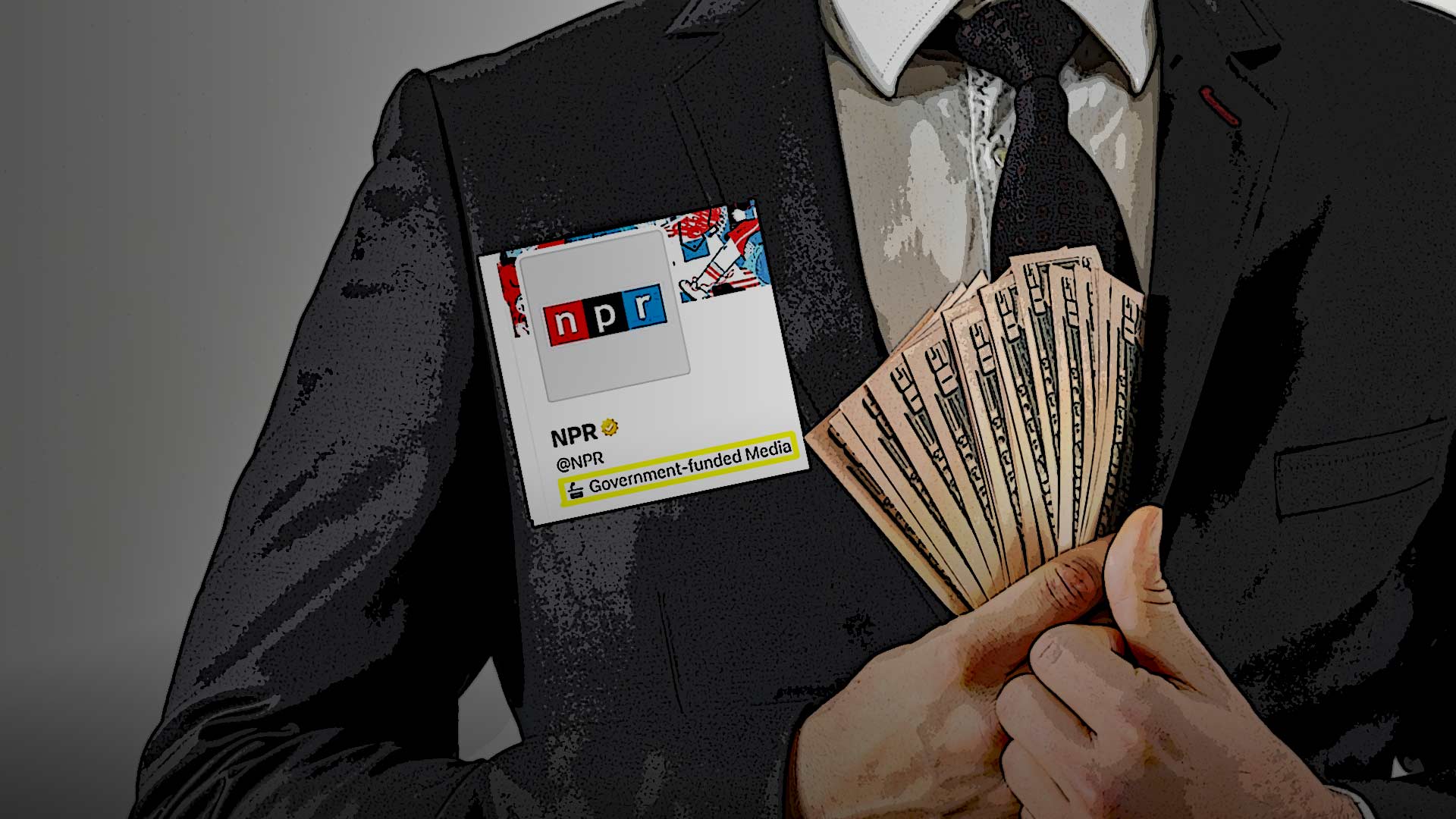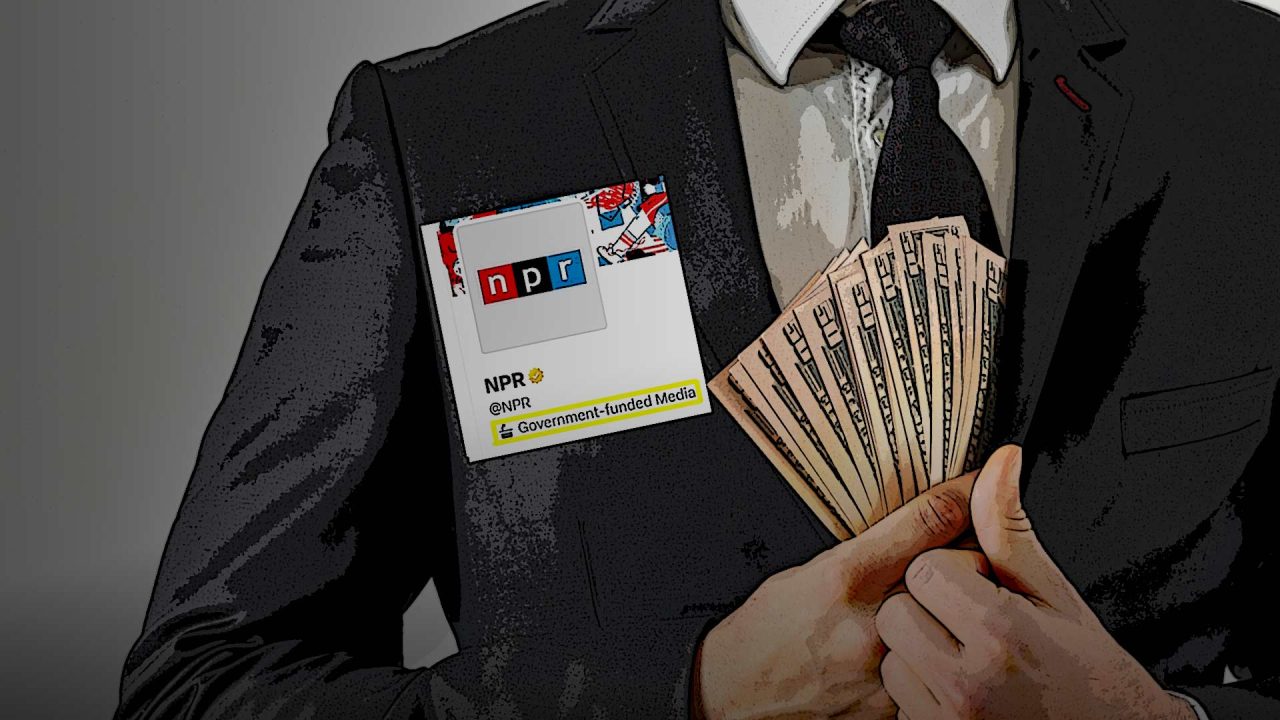
The federal government is $36 trillion in debt, yet we’re still spending $535 million a year on the Corporation for Public Broadcasting (CPB), a significant portion of which supports National Public Radio (NPR). Taxpayer dollars should be spent wisely, yet we continue subsidizing a media organization that could – and should – survive on its own.
NPR claims it receives only 1% of its budget directly from federal funding, but that’s misleading. Many of its member stations rely on CPB funding for 10-15% of their budgets, which they then use to pay NPR licensing fees. When you track the money, NPR’s overall reliance on taxpayer funds is closer to 20%. When infrastructure, border security, and essential services face budget constraints, it’s time to ask: Why are we still funding a media organization that is losing audience and no longer represents the entire public?
Taxpayer-funded journalism should serve the entire public, yet even NPR’s own insiders admit it has abandoned ideological diversity.
There was a time when public radio made sense – back in 1970, when media options were limited. NPR provided vital information in an era before 24-hour news and the internet. But in 2025, the landscape has changed. Americans have access to thousands of entertainment and news sources, podcasts, streaming platforms, and independent journalism. NPR’s audience is shrinking, down from 60 million in 2020 to 42 million in 2024.
Meanwhile, private media companies like The New York Times, Spotify, and independent podcasters have built successful, self-sustaining business models without government subsidies. NPR already generates 36% of its revenue from corporate sponsors and 30% from member station dues. It has a loyal listener base willing to contribute – so why should taxpayers continue footing the bill? Defunding NPR would force it to compete on equal footing, just like every other media outlet.
Taxpayer-funded journalism should serve the entire public, yet even NPR’s own insiders admit it has abandoned ideological diversity. Longtime NPR editor Uri Berliner recently revealed that the network has become an echo chamber, catering almost exclusively to a left-leaning audience.
ALASKA WATCHMAN DIRECT TO YOUR INBOX
Consider the evidence:
• NPR gave 25 interviews to Adam Schiff on Trump-Russia collusion, yet when the Mueller report discredited the narrative, coverage all but disappeared.
• In 2020, NPR dismissed Hunter Biden’s laptop as a “distraction,” despite its later confirmation as authentic.
• NPR repeatedly promoted the wet-market COVID origin theory, ignoring early lab-leak concerns – even when agencies like the Department of Energy later acknowledged its credibility.
Berliner also exposed NPR’s lack of political diversity, revealing that its Washington, D.C., newsroom has 87 registered Democrats and zero Republicans. A government-funded media outlet should be unbiased and represent all Americans, but NPR has actively driven away conservatives and moderates. In 2011, 26% of NPR’s audience identified as conservative. By 2023, that number had dropped to just 11%. This is not a neutral news organization; it’s a partisan one.
A government-funded media outlet should be unbiased and represent all Americans, but NPR has actively driven away conservatives and moderates.
Beyond political bias, NPR has also failed to reach diverse audiences:
• Only 3 in 10 Americans familiar with NPR trust it as a news source.
• Black and Hispanic listeners each make up just 6-7% of NPR’s audience, despite comprising 14.4% and 19% of the U.S. population.
Even its digital platforms are struggling – podcast downloads have dropped significantly since 2020. NPR has failed to adapt to the modern media environment, yet taxpayers are expected to keep it afloat.
Some argue that rural stations, like KTOO in Alaska, which gets 30% of its budget from federal funds, would struggle without CPB grants. But states like New York already supplement public media, and private foundations (like the Ford and MacArthur Foundations) have stepped in before. A phased reduction in federal funding would give stations time to adjust.
Defunding NPR wouldn’t silence it; it would simply put it on the same playing field as every other media company. Let it earn its place in the market, not rely on taxpayers to keep it afloat.
That’s why I’m taking this fight to Alaska’s budget. If Washington won’t act, we will. We have critical priorities in our state including roads, ferries, law enforcement, and energy projects, and we can’t afford to throw money at a media outlet that fails to serve all Alaskans. The government should not be in the business of funding journalism, especially not one-sided journalism. I will push to cut state funding for NPR affiliates in Alaska, ensuring that every dollar in our budget goes toward services that benefit the people – not a media corporation that can stand on its own.
NPR is a media organization with a clear political bias, a shrinking audience, and a funding model that is no longer necessary in today’s world. The government should not be in the business of funding journalism, especially when private media outlets survive without subsidies.
Defunding NPR wouldn’t silence it; it would simply put it on the same playing field as every other media company. Let it earn its place in the market, not rely on taxpayers to keep it afloat.
The views expressed here are those of the author.







19 Comments
Great Essay Representative McCabe!!!! You are courageous. We are praying for you and the others in battle in the legislature.
This is still the WRONG premise. I used to decry federal subsidies to the fine arts (Nat’l Endowment for the Arts) because of its blasphemous and pornographic content, subsidized by the public. That was a mistake. ALL subsidies to the arts, broadcasting, foreign aid, etc, etc, etc are unquestionably unconstitutional. Even if we were to subsidize Michaelangelo or Van Gogh or Picasso or Grant Wood or Renoir. The fact that NPR used to be “good” is a matter of subjectivity. In my recollection, conservatives have ALWAYS been annoyed by its Leftist slant. No, not even a slant. It was BRAZEN in its bias, from the beginning. If NPR had been scrupulously neutral all along, it would still be a bad idea and unconstitutional. The 10th Amendment is there for a reason. You want federal subsidies for the arts or for public broadcasting? Then pass a constitutional amendment!
We never should have been paying ANYTHING to them in the first place. They are media, HELLO!
Totally agree with the title.
” ALL subsidies to the arts, broadcasting, foreign aid, etc, etc, etc are unquestionably unconstitutional.” No, I think all those, including etc, etc, etc, are constitutional. Socially, they are a national and global good, I hope you agree (fun fact: four million people in Sudan are starving. USA could do something about that). I want my federal tax dollars feeding global citizens not killing them. How strict of an American isolationist are you? I’m on the globalist side.
Liberalism is a dangerous and irrational belief system that threatens the fabric of society.
Liberalism is not a political ideology, but rather a psychological condition that distorts the way individuals view the world.
Liberals are driven by irrational emotions, such as guilt, envy, and narcissism, rather than reason and logic.
Liberals suffer from a pathological altruism, wherein they prioritize the well-being of others, often at the expense of their own self-interest. Liberals exhibit a form of self-loathing, which leads them to undermine their own culture, values, and national identity in the name of political correctness and multiculturalism.
Liberalism fosters a sense of moral relativism, where no absolute standards of right and wrong exist.
This results in a society devoid of moral clarity and ethical boundaries. Liberals also embrace of socialism, which is a utopian fantasy that ignores human nature and leads to economic ruin.
Liberal policies, such as open borders, welfare dependency, and political correctness, have led to societal breakdown, increased crime, and a decline in personal responsibility. Liberalism has weakened America’s national security and sovereignty.
Liberal media and academia have perpetuated this mental disorder by promoting biased narratives, suppressing dissenting voices, and indoctrinating the younger generation. Unless this liberal mental disorder is recognized and addressed, it will continue to erode the fabric of society.
~Unknown Author~
Feel free to copy and share.
Anna Karenina was a liberal and see how she ended? Save the liberals: we should be able to obtain social security disability benefits for this condition, contingent on attending regular re-education programs developed by Stephen Miller.
I use to listen to NPR and watch PBS until I realized they are extremely biased toward the liberal view. So, being the that we have a free market I switched to more balanced listening and viewing. It only makes sense that NPR is biased, the deep state has been in control of the American agenda therefore they control what PBS and NPR broadcast. Unfortunately Lisa Murkowski refuses to address the de-funding of NPR since they seem to support her, and assist in election propaganda in her favor.
America is being defleshed by the obvious dictator felon Trump and Joel chooses this and other insignificant topics to report on.
TDS is strong in you
mm defleshed. Sounds like a good idea
no more funds to macaroni McCabe
Eastmans needed for governor
One of the best articles I’ve read this year.
Great articles and research concerning third term presidency and the research concerning NPR. Thankyou Alaska Watchman. I am praying our State of Alaska will desire wisdom and understanding concerning the moral integrity of our national constitution and return to the roots our forefathers established in the institution of our laws and amendments based on biblical principals. Read Proverbs 6:16-19, may it be the platform of our accountability before God.
Karen, if you want to return to the integrity of our national constitution, remove Trump.
One of the few thing I support of representative McCabe on but, it like putting your finger to the wind and judging the voters . Like joining a parade when the band and all the floats have gone by. I maybe wrong, isn’t he the representative who blocked people on his web site?
yep, and he became abusive and rude when I nailed him on his conflict of interest in MSB getting funding steered to his road. I still see him as compromised and not trustworthy. This effort to defund CPB is noteworthy, however – as far as I can throw him.
McCabe is a socialist rino !!!!! His carbon bloated HEAD , IS IMPLOADING!